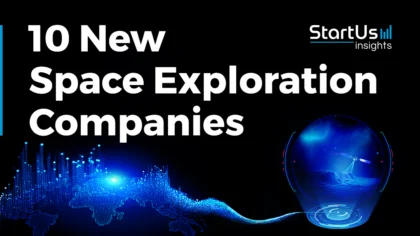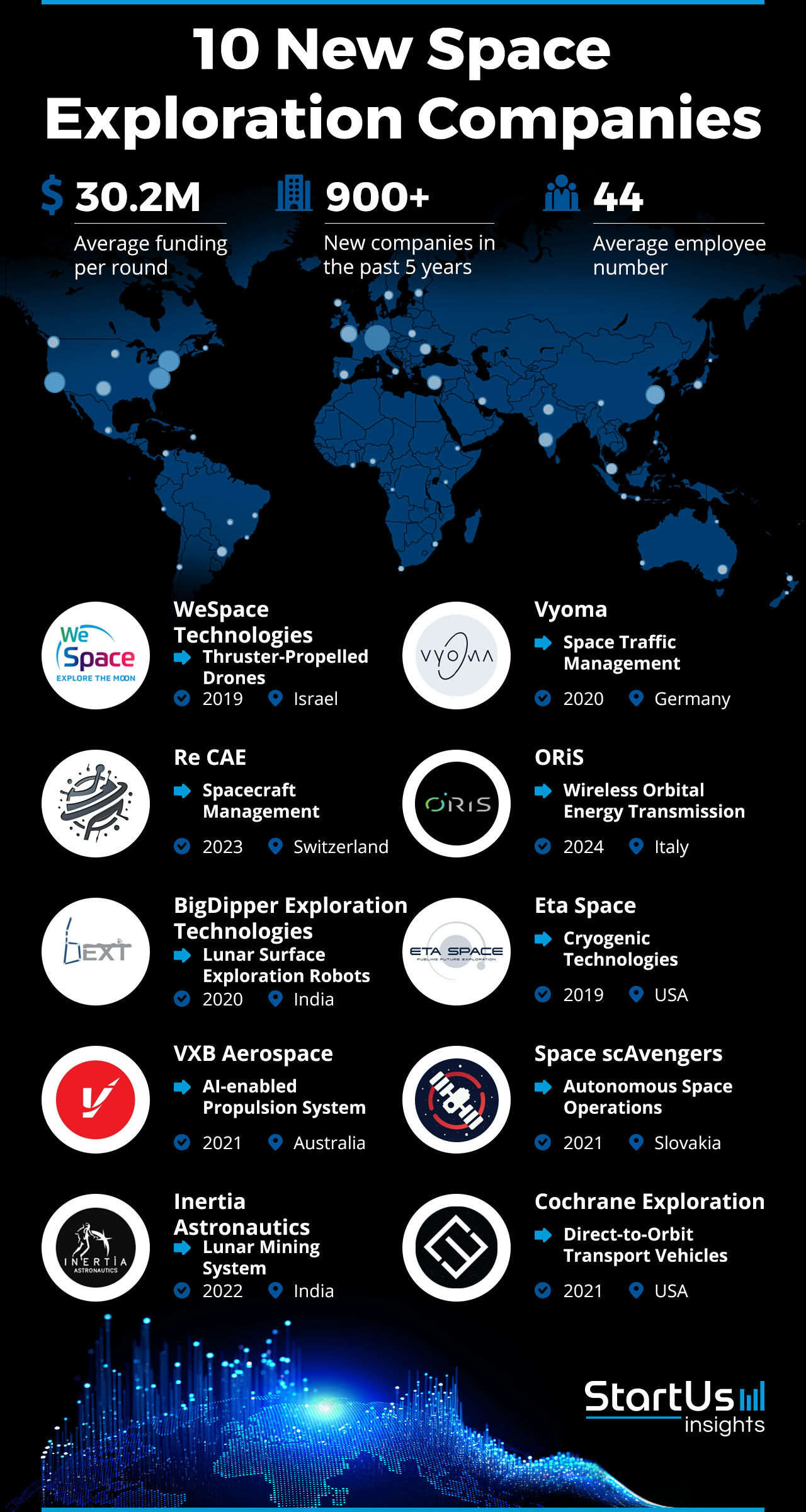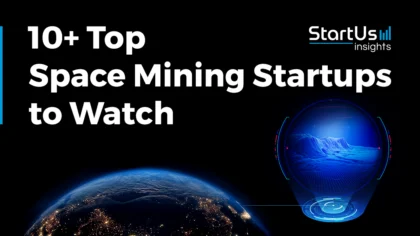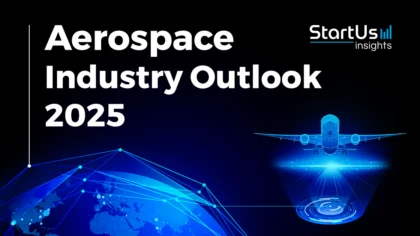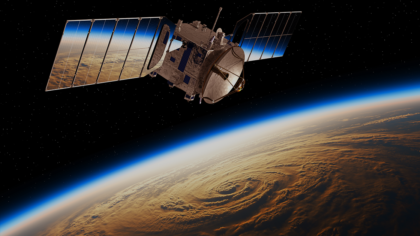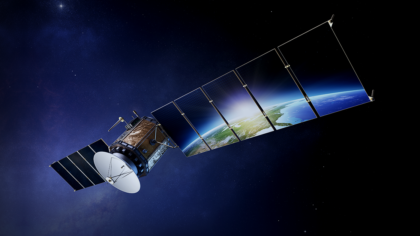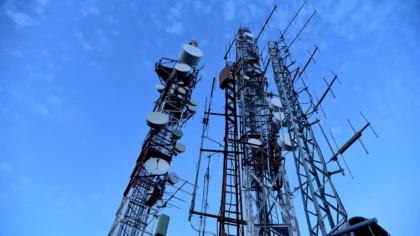Accelerate Productivity in 2025
Reignite Growth Despite the Global Slowdown
This article provides an analytical overview of 10 new space exploration companies advancing the industry through cutting-edge technologies. These companies offer solutions such as advanced cryogenic technologies for fuel efficiency, autonomous flying robots for complex space missions, and more. Read on to explore all 10 solutions in detail.
Continue reading to gain up-to-date and data-driven insights on:
- Profiles of 10 Emerging Space Exploration Companies
- How to Scout the Best Space Exploration Companies Easily
Key Takeaways
Drawing insights from the Big Data & AI-powered StartUs Insights Discovery Platform that provides data on over 4.7+ million emerging companies globally, we explore the evolving landscape of the space exploration industry. This sector is marked by key trends and a substantial workforce, shaping its future. This report was last updated 5 days ago. Spot an error or missing detail? Help us fix it by getting in touch! Here are some key insights at a glance:
- Current Space Exploration Trends: Some of the major trends impacting the space exploration industry are autonomous systems, additive manufacturing, next-generation telescopes & sensors, miniaturization, and new propulsion technology.
- Space Exploration Industry Statistics: The sector comprises 4.9K+ organizations worldwide. Out of these, 900+ new space exploration companies were founded in the last five years, with 2020 as the average founding year. On average, each of these companies employs about 44 people. Moreover, the average funding received by these 900+ space exploration companies per round in the same span is USD 44.47 million.
- 10 Top Space Exploration Companies to Watch:
- WeSpace Technologies – Thruster-Propelled Drones
- Re CAE – Spacecraft Management
- BigDipper Exploration Technologies – Lunar Surface Exploration Robots
- VXB Aerospace – AI-enabled Propulsion System
- Inertia Astronautics – Lunar Mining System
- Vyoma – Space Traffic Management
- ORiS – Wireless Orbital Energy Transmission
- Eta Space – Cryogenic Technologies
- Space scAvengers – Autonomous Space Operations
- Cochrane Exploration – Direct-to-Orbit Transport Vehicles
Meet 10 out of 900+ New Space Exploration Companies
In this section, we spotlight 10 emerging space exploration companies offering space communication services, direct-to-orbit transport vehicles, space traffic management, and cryogenic technology. These companies integrate advanced robotics, automation, artificial intelligence, cryogenic engineering, and more to enhance mission accuracy, operational efficiency, and environmental adaptability. Read on to explore many more innovative solutions that these companies offer!
Note on Signal Strength
One of the unique metrics we feature for each company is Signal Strength, a proprietary data point generated by our Discovery Platform. It gauges the extent to which a company’s influence has permeated the global ecosystem of startups, scaleups, and emerging companies. This proprietary metric serves as a valuable guidepost for understanding a company’s standing in the broader market landscape.
1. WeSpace Technologies
- Founding Year: 2019
- Employee Range: 2-10
- Location: Israel
- Signal Strength: Very Strong
- What they do: WeSpace Technologies develops thruster-propelled drones for lunar surface exploration. Its mobility system enables the exploration of rough terrain and previously inaccessible lunar regions as well as features enhanced data collection for detailed lunar mapping and resource extraction. By flying over obstacles, they overcome the limitations of traditional rovers and provide accessibility to the Moon’s underground, including lava tubes and permanently shadowed regions (PSRs). This technology significantly enhances scientific and commercial lunar missions.
2. Re CAE
- Founding Year: 2023
- Employee Range: 2-10
- Location: Switzerland
- Signal Strength: Medium Strong
- What they do: Re CAE provides a suite of cloud-based software tools for spacecraft management. RE.PROPAGATE assesses collision risk and predicts orbital evolution. RE.ENTRY simulates re-entry trajectories and ablation processes. RE.CFD utilizes computational fluid dynamics for aerodynamic analysis. The Pass Predictions API offers real-time satellite pass information and automated data retrieval. Horos, an educational app, promotes space sustainability through satellite and debris tracking. Leveraging cloud-based Kubernetes, parallel programming, and 3D graphics, Re CAE optimizes computational efficiency and delivers actionable insights to aerospace engineers and researchers, enhancing mission safety and operational efficiency.
3. BigDipper Exploration Technologies
- Founding Year: 2020
- Employee Range: 2-10
- Location: India
- Signal Strength: Very Strong
- What they do: Big Dipper Exploration engineers modular, solar-powered robots for autonomous lunar surface operations. These robots utilize swarm intelligence to collect data and extract resources like water ice, crucial for establishing a long-term human presence on the Moon. Its technology offers services including payload delivery, data collection, infrastructure deployment, and mining capabilities. This accelerates the development of a lunar economy by providing vital infrastructure for resource identification and extraction. Aerospace organizations and commercial space entities benefit from Big Dipper Exploration’s solutions, advancing sustainable space exploration.
4. VXB Aerospace
- Founding Year: 2021
- Employee Range: 2-10
- Location: Australia
- Signal Strength: Medium
- What they do: VXB Aerospace develops advanced space systems through AI-driven satellite design and integration. Its Hall effect propulsion technology, exemplified by the ZEPHYR-35 thruster, offers satellite mobility and extended lifespans. Utilizing propellants like Argon, Krypton, and Xenon, the thruster delivers high specific impulse and rapid ignition. Apart from propulsion, VXB’s systems support in-orbit refueling, assembly, servicing, and de-orbiting operations, addressing the growing satellite market. The company’s technology enhances satellite performance, reduces operational costs, and mitigates collision risks, benefiting satellite operators seeking efficient and scalable solutions.
5. Inertia Astronautics
- Founding Year: 2022
- Employee Range: 2-10
- Location: India
- Signal Strength: Medium Strong
- What they do: Inertia Astronautics provides robotic solutions for lunar exploration. Its Lunar-Transporter and Gantry System (L-TAG), comprising an inflatable crane and BHEEM transporter, efficiently handles and moves cargo on the Moon. Additionally, the company offers a Lunar Lighting System, using a deployable heliostat to illuminate shadowed regions, aiding research and resource exploration. Its Lunar Mining System, including the Lunar-Water framework, extracts and transports water ice, supporting in-situ resource utilization. These technologies enhance operational efficiency and sustainable lunar missions.
6. Vyoma
- Founding Year: 2020
- Employee Range: 11-50
- Location: Germany
- Signal Strength: Very Strong
- What they do: Vyoma specializes in satellite-based observation systems for space traffic management. The company’s sensor network, comprising ground-based and in-orbit sensors, delivers precise orbital data for enhanced decision-making. Continuous monitoring of active satellites and space debris ensures comprehensive coverage. The telescope network also increases transparency in future observations and orbit uncertainties. Vyoma’s system regularly detects uncatalogued space objects and maintains a space object catalog. This system enables collision warnings and automated evasive maneuvers to ensure safe and efficient satellite operations. Beneficiaries include commercial space operators and defense organizations.
7. ORiS
- Founding Year: 2024
- Employee Range: 2-10
- Location: Italy
- Signal Strength: Strong
- What they do: ORiS offers wireless power transmission technology that supports activities on the lunar surface. It eliminates the need for frequent docking and manual recharging, making satellites more effective for high-demand operations. The company leverages laser technology to mitigate space debris by targeting and ablating debris. This solution benefits lunar development projects, satellite operations, and space debris mitigation efforts. By enhancing energy solutions and debris management, ORiS significantly contributes to safer and more efficient space operations.
8. Eta Space
- Founding Year: 2019
- Employee Range: 11-50
- Location: USA
- Signal Strength: Very Strong
- What they do: Eta Space specializes in advanced cryogenic technologies for sustainable space exploration. Its LOXSAT satellite demonstrates zero-loss cryogenic fluid management, paving the way for Cryo-Dock, an orbital propellant depot. By enabling in-space refueling, these depots support extended space missions. Eta Space also develops cryocoolers, optimizes thermal management, and establishes infrastructure for lunar propellant production, including a Lunar Oxygen Station (LOS). The company’s focus on in-situ resource utilization (ISRU) and cryogenic liquefaction of lunar resources further advances sustainable space exploration, providing critical fuel management solutions for future missions.
9. Space scAvengers
- Founding Year: 2021
- Employee Range: 2-10
- Location: Slovakia
- Signal Strength: Medium Strong
- What they do: Space scAvengers develops software and hardware solutions for autonomous space operations. The company’s software, Mission Simulator, validates automated orbital servicing missions through a multi-agent and cooperative approach. Its guidance, navigation, and control (GNC) software coordinates these missions, incorporating inter-satellite and ground control communication. Space scAvengers also creates scalable, modular multi-agent spacecraft fleets for in-orbit servicing and space transportation. These autonomous fleets utilize AI-trained GNC and direct target contact that enhance mission efficiency and reduce risk.
10. Cochrane Exploration
- Founding Year: 2021
- Employee Range: 2-10
- Location: USA
- Signal Strength: Medium
- What they do: Cochrane Exploration develops direct-to-orbit vehicles, Lunar 1 and Terran 1, utilizing hybrid propulsion and cost-effective fuels to reduce launch expenses. These vehicles enhance safety through air-breathing and aerospike rocket engines, coupled with horizontal takeoff and landing capabilities. By deploying unmanned vehicles for space debris removal, Cochrane Exploration improves orbital safety. The company thus makes spaceflight more accessible and affordable for individuals, corporations, and governments, promoting sustainable space operations.
Quick Tip to Find New Space Exploration Companies
Utilizing a SaaS platform like the Discovery Platform for identifying new space exploration solutions provides significant benefits compared to traditional scouting methods:
- Streamlined Efficiency: The Discovery Platform offers advanced tools that streamline the scouting process. It replaces hours of your conventional desk research, saving time and resources in identifying space exploration innovations.
- Access to Real-time Insights: Gain a competitive edge with up-to-date information on the latest trends in the space exploration industry. The platform keeps you informed with near real-time updates on emerging space exploration companies and news, enabling you to make swift and informed decisions.
- Tailored Exploration: Customize your search to focus on specific niches within the space exploration sector, such as autonomous drones, space mission automation, or spacecraft management. The platform’s diverse filtering options allow you to target your scouting efforts precisely, ensuring that you find the most relevant and groundbreaking companies in the field.
Ready to Explore All New Space Exploration Companies?
We’ve explored the dynamic landscape of the space exploration industry, examining the latest trends and spotlighting exceptional companies driving innovation. To dive deeper, download our free SpaceTech Report or schedule a demo of the Discovery Platform for a customized exploration of these groundbreaking developments. Interested in contributing your expertise on startups and tech? We’d love to hear from you.

